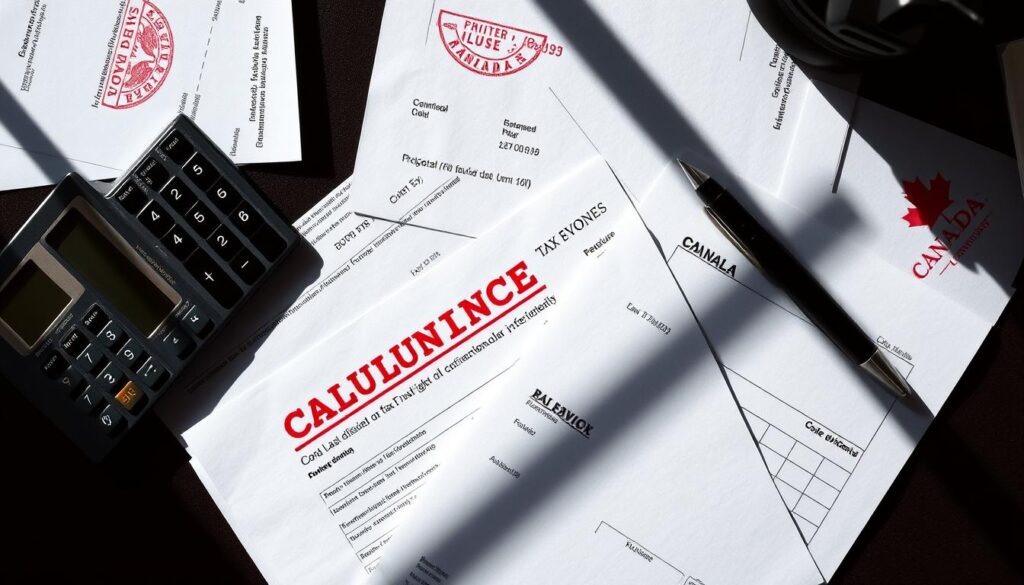Table of Contents
Did you know that tax evasion in Canada can result in fines ranging from 50% to 200% of the evaded amount? This staggering penalty underscores the seriousness of this offence under Canadian law. Understanding the implications of tax evasion is crucial for every taxpayer, as the consequences extend beyond financial penalties to include potential imprisonment.
Tax evasion is distinct from tax avoidance, which involves exploiting legal loopholes. Evasion, however, involves intentional actions to deceive the Canada Revenue Agency (CRA). This can include underreporting income, overstating deductions, or failing to file tax returns altogether.
The CRA has intensified its efforts to combat tax evasion, implementing programs like the Informant Leads Program to encourage reporting of suspected offences. Penalties for tax evasion can lead to severe financial hardship and even imprisonment for up to two years for summary convictions, and up to five years for indictable offences.
If you or someone you know is facing charges related to tax evasion, it is essential to seek expert legal advice. Sohi Law Group is here to provide guidance and support. Call them today at 833-877-9797 for a confidential consultation.
Understanding the Scope of Tax Evasion in Canada
Tax evasion is a serious offence in Canada, involving intentional actions to deceive tax authorities. It’s important to understand the legal terms and concepts surrounding this issue to navigate the complexities effectively.
Key Definitions and Legal Concepts
A person under the Income Tax Act includes individuals, corporations, and trusts, all of whom are considered taxpayers with specific obligations. An offence in this context refers to any action violating tax laws, leading to penalties or criminal charges.
The distinction between summary conviction and indictable offences is crucial. Summary convictions typically result in less severe penalties, while indictable offences may lead to imprisonment for up to five years. Understanding these classifications helps taxpayers grasp the potential consequences of their actions.
Overview of Relevant Legislation and Enforcement
Sections 239 and 239(1.1) of the Income Tax Act outline penalties for tax evasion, including fines and possible imprisonment. The Canada Revenue Agency (CRA) enforces these laws, using programs like the Informant Leads Program to detect and prosecute offences.
| Offence Type | Penalty Range | Imprisonment |
|---|---|---|
| Summary Conviction | Up to 50% of evaded amount | Up to 2 years |
| Indictable Offence | Up to 200% of evaded amount | Up to 5 years |
Understanding these legal boundaries is essential for compliance and to avoid severe penalties. Consulting with legal experts can provide clarity and protection for those facing charges.
Exploring Tax Evasion Fines in Canada
Understanding the financial and legal consequences of tax evasion is crucial for every taxpayer in Canada. The penalties can be severe, impacting both personal and business finances. This section delves into how these fines are calculated and the differences between summary and indictable offences.
Penalty Calculations and Fine Ranges
The Canada Revenue Agency (CRA) calculates penalties based on the amount of tax evaded. Fines can range from 50% to 200% of the evaded tax. For instance, if $10,000 in taxes were evaded, the penalty could be between $5,000 and $20,000. This significant range underscores the seriousness of tax evasion under the Income Tax Act.
Summary vs. Indictable Offence Differences
Summary conviction offences typically result in less severe penalties, with fines up to 50% of the evaded amount and imprisonment of up to two years. Indictable offences, however, can lead to fines up to 200% and imprisonment for up to five years. Understanding these distinctions is vital for comprehending the legal implications.

For more information on understanding anti-avoidance rules in Canadian tax law, visit Jeremy Scott’s resource. If you’re facing charges, consult with legal experts like Sohi Law Group for guidance.
Legal Implications and Consequences for Tax Evaders
Tax evasion carries severe legal and personal consequences in Canada, affecting both individuals and businesses. Understanding these repercussions is crucial for anyone facing accusations.
Potential Jail Time and Civil Penalties
Under the Income Tax Act, tax evasion can lead to significant penalties. For summary convictions, fines range from 50% to 200% of the evaded amount, with imprisonment up to two years. Indictable offences may result in fines of 100% to 200% and up to five years in prison. Additionally, criminal charges under the Excise Tax Act can lead to similar penalties.
Civil penalties include hefty fines and interest on the evaded amount. The CRA may also seize assets to recover unpaid taxes. A criminal record from tax evasion can impact employment, travel, and other aspects of life, making legal representation essential.
For instance, failing to file a tax return can result in fines between $1,000 and $25,000. Fraud cases may lead to imprisonment, with sentences up to 14 years if the fraud exceeds $1 million. These consequences highlight the importance of compliance and seeking legal advice if accused.

If facing tax evasion charges, consulting experts like Sohi Law Group is crucial. Their legal expertise can guide you through the complexities and help mitigate potential consequences. Contact them today at 833-877-9797 for confidential assistance.
Navigating Legal Representation and Expert Guidance
Facing allegations of tax evasion can be overwhelming, but seeking expert legal guidance is the first step toward resolving the issue. Legal representation is crucial to navigate the complexities of the Income Tax Act and ensure your rights are protected.
When to Contact Sohi Law Group at 833-877-9797
It’s essential to act quickly when dealing with tax-related legal issues. Sohi Law Group offers expert legal representation and can guide you through negotiations with the CRA or defend against criminal charges. Their team is available 24/7 to provide the support you need.
Insights from Experienced Tax Lawyers
Experienced tax lawyers can offer valuable insights and real-world advice. They can help you understand the legal process, negotiate settlements, and defend against charges. For instance, their expertise can help you avoid severe penalties and protect your financial future.

Consulting with legal experts like Sohi Law Group can make a significant difference in the outcome of your case. They provide tailored strategies and ensure you’re well-prepared for any legal challenges. Don’t hesitate to contact them at 833-877-9797 for a free case evaluation and expert advice.
For more information on trusted criminal defense representation in Canada, visit Sohi Law Group. Their expertise can help you navigate the legal landscape effectively.
Conclusion
Understanding the consequences of tax evasion is essential for every Canadian taxpayer. This offence can lead to severe penalties, including fines and potential imprisonment, which vary depending on whether the offence is summary or indictable. The CRA rigorously enforces these laws, making it crucial for individuals and businesses to comply with tax obligations.
Civil penalties for tax evasion can include fines of up to 200% of the evaded amount, while criminal charges may result in imprisonment for up to five years. The distinction between summary and indictable offences is vital, as the latter carries more severe consequences. Legal terms like “person” and “taxpayer” are broadly defined under the Income Tax Act, encompassing individuals, corporations, and trusts.
Expert legal guidance is indispensable when facing such charges. Consulting with experienced tax lawyers can provide clarity and protection, helping navigate the complexities of the Income Tax Act. For those seeking trusted representation, Sohi Law Group offers tailored strategies and support. Contact them today at 833-877-9797 for a confidential consultation.
Informed decision-making is the best defense against legal repercussions. Being well-informed about tax laws and seeking professional advice can mitigate risks and ensure compliance. Stay proactive to avoid adverse outcomes and protect your financial future.





No comment